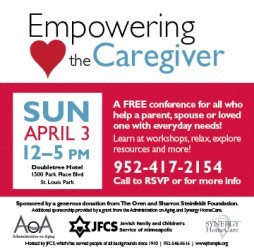This is a guest post by Sarah Malakoff at Jewish Family and Children’s Service of Minneapolis.
Chances are that if you’re a TC Jewfolk reader, your parent is a Baby Boomer — a member of the generation born between 1946 and 1964. There are about 78 million of these adults commonly described as work-centric, independent, goal-oriented and competitive. They’re known as a vigilant group that plays a huge role in today’s economy and our daily lives. But, like the rest of us, they’re getting older every day.
Implications of this population’s aging have been talked about for years and, as many sources have predicted, the results could be dire. Rising demands on Medicare, Medicaid, senior housing facilities, hospitals … Baby Boomers could put tremendous stress on the healthcare system.
What isn’t talked about as frequently is the impact on us — the generation that will potentially be caring for our Baby Boomer parents — or how we can support our parents now as they’re becoming caregivers.
Empowering the Caregiver, which is intended to educate, pamper and inspire attendees, is free and open to everyone. The conference will be held from noon to 5 p.m. at the Doubletree Hotel in St. Louis Park (1500 Park Place Boulevard). RSVP to 952-542-4878 or [email protected].
The conference will feature speakers on a variety of topics, including caring for the mind, body and spirit; preparing for legal matters; maintaining your identity, and accessing resources such as Medicare and veterans’ benefits. Keynote speaker and caregiver Molly Cox, recently dubbed the “Cover Girl of Care” by Fox 9 News, has a lot to say—not only about how to be a caregiver, but about the importance of self-care. Check out Molly’s website and the video of her on Fox 9 here.
Here’s what Allison has to say about the challenges of becoming a caregiver and how to support the caregivers you already know.
Q: What feelings do people experience when they become a caregiver for a loved one?
A: One of the most difficult challenges for anyone when they first become a caregiver is what’s often referred to as the “loss of dreams.” We all have a vision for what we expect our lives will look like; when this gets disrupted, such as by a loved one’s chronic illness, we no longer know if that vision will hold true.
We often go through a period of grieving when this happens; we grieve for our loved one’s health, but also for visions and dreams we are losing. This is especially challenging for those who become caregivers at an early age. They most likely had many plans for different stages in their life, and now those plans will be put off or canceled altogether. Instead of just losing the vision for what retirement with their spouse would look like, they might be losing the vision of what having a career would look like, what having children would look like, even what having family involved in their life would look like. These are all losses the early caregiver might be grieving, in addition to dealing with the everyday tasks of caregiving.
Q: What tips do you have for people who want to help caregivers they know?
A: The best way to help and support caregivers is to simply be there for them. Offer to help in specific ways: offer to grocery shop once a week on a certain day, offer to prepare dinner for Tuesday and Thursday nights, offer to stay with the care receiver for three hours on Sunday mornings so the caregiver can get out of the house.
Q: How can people provide support to caregivers?
A: Caregivers also need a lot of support through the daily challenges and stresses they face; if you’re willing to be a sympathetic ear, make them understand that you truly want to hear how they are doing and let them vent to you as often as they need. Also, walk them through the necessary steps to get connected with local resources. Attending support groups, talking to other caregivers, and working with a caregiver coach are all very helpful, but often caregivers need a push in the right direction because they’re too overwhelmed to reach out to resources on their own. Finally, help them have a little fun! Take them out to dinner and a movie or go for a walk around the lake, and don’t accept no for an answer! Taking care of themselves is the number one key to staying healthy and sane as a caregiver, but caregivers often feel guilty taking time out from their duties. Convince them that it is OK and necessary to take care of themselves.
Q: How can someone prepare for becoming a caregiver?
A: It’s estimated that two thirds of the U.S. population expects to be a caregiver at some point in the future, so it’s a role we all should be prepared for. One way to prepare is to have all the appropriate legal documents in place for ourselves and our loved ones. Power of attorney, healthcare directives, wills, and even funeral arrangements can take a lot of stress off our families if they’re in place before we need them.
It’s always best to talk to our families so they know our wishes and we know theirs; this is especially true when talking about healthcare decisions.
On a more personal level, the best thing we can do is be mentally prepared. Remember that when we become caregivers, we’re going to need to take care of ourselves and provide balance. Writing our future selves a letter with these reminders could be a great source of comfort and support for when we start dealing with the daily stress of being a caregiver.
Have more questions about becoming a caregiver? The Empowering the Caregiver conference on Sunday, April 3, should help. But if you can’t make it to the conference, Allison can be contacted at 952-417-2154 or [email protected].


